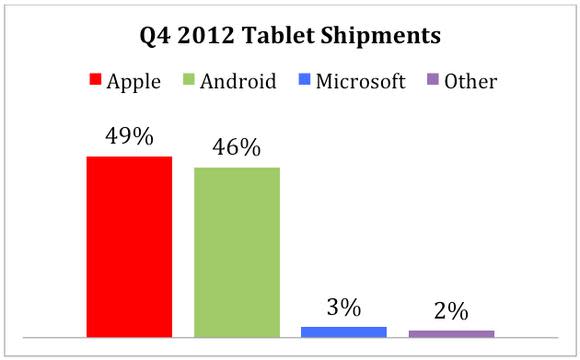Latest Tablet Shipment Report Shows Microsoft Needs Help
The research firm Canalys released a report this week on fourth-quarter 2012 tablet shipments, and so far things don't look too good for Microsoft's Surface tablet. It's the company's first step into the tablet world, and Microsoft is learning that selling devices isn't as easy as having the latest product on the market.
Tablets gaining ground, mostly
The Canalys report says that worldwide shipment of PCs (including tablets) increased 12% year over year, with a total of 134 million units shipped in Q4 2012. Out of that number about one-third were tablets, which saw a year-over-year increase in shipments by 75%.
This should be good news for all tablet makers, but Microsoft shouldn't be too excited. As you can see from the graph below, the company is trailing significantly behind Apple iPads and Google's Android tablets.

Source: Canalys.
The fourth quarter of 2012 was the first time Apple didn't scoop up more than 50% of tablet shipments, but the company still leads the pack nonetheless. Estimates for actual sales of Surface tablets are expected to be around 700,000. For comparison's sake, Apple sold a record 22.9 million iPads in its most recent quarter. But low shipments and sales aren't the only problem for Microsoft. The company also had a "very high" return rate on Surface tablets, according to an analyst at IHS iSuppli. But it's important to remember that new product launches aren't going to enjoy the same numbers as established products like the iPad do, and even Amazon's Kindle Fire had reports of high return rates after its initial launched.

Source: Microsoft. Surface Pro shown.
One contributing factor to low Surface sales was the fact that Microsoft chose to initially launch the tablets in its retail stores. With about 50 stores currently open, the company doesn't have many touchpoints with consumers. With the launch of the new Surface Pro set for this Saturday, Microsoft and its investors hope the new version of the tablet will bring higher sales numbers. The Pro offers a full version of Windows 8, which will run PC programs like Photoshop and Microsoft Office, comes with up to 128 GB of storage, and has sharper screen. The Surface Pro can be had for $899, but as fellow Fool Evan Niu points out, storage space on the new Pro may be much less than Microsoft is advertising.
Microsoft's mobile game
I've said before that now's the time for Microsoft to get mobile right. The latest tablet shipment numbers aren't very encouraging, though, and it remains to be seen whether consumers want a tablet that functions more like a PC. With the high popularity of mobile apps, and their increasing ability for real productivity, one has to wonder if the a Surface Pro running Windows 8 is worth it for consumers and businesses when cheaper and similarly capable alternatives already exist.
Investors should look for signs that Surface sales are turning around and that the new Pro lineup is well received. A better distribution strategy, (i.e., selling in more stores than just its own and BestBuy) for the Surface tablets would also help the company get more tablets into more hands. If stronger distribution and higher sales don't come to fruition in the next quarter or two, Microsoft will be even further behind in the tablet race than it is now.
With all the effort Microsoft has placed into its new WIndows 8, Surface tablets and Windows Phones, it's been a frustrating path for Microsoft investors, who've watched the company fail to capitalize on the incredible growth in mobile over the past decade. But it's not too late for the company to make a splash in a booming market. In this brand-new premium report on Microsoft, our analyst explains that while the opportunity is huge, the challenges are many. He's also providing regular updates as key events occur, so make sure to claim a copy of this report now by clicking here.
The article Latest Tablet Shipment Report Shows Microsoft Needs Help originally appeared on Fool.com.
Fool contributor Chris Neiger has no position in any stocks mentioned. The Motley Fool recommends Amazon.com, Apple, and Google. The Motley Fool owns shares of Amazon.com, Apple, Google, and Microsoft. Try any of our Foolish newsletter services free for 30 days. We Fools may not all hold the same opinions, but we all believe that considering a diverse range of insights makes us better investors. The Motley Fool has a disclosure policy.
Copyright © 1995 - 2013 The Motley Fool, LLC. All rights reserved. The Motley Fool has a disclosure policy.

